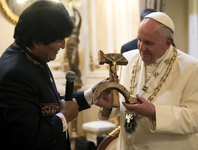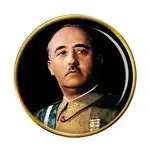Google "dirty war in Argentina and the role of Francis". He was 100% anti communist. And my guess is he is still a fascist. Not a commie. A fascist. But this is a guess. That he was against communists in Argentina it´s a known public irrefutable fact.Are you sure he was a "ruthless anti-communist"? Pope Francis is a full-blown Marxist and Globalist. It is not hard to spot Marxism-Globalism patterns by Pope Francis when he interacted and met with LGBQT+, WEF Klaus Schwab, Barack Obama, Fidel Castro, etc.
Below is a portion near the conclusion of an extremely long detailed and well-researched article by Frank De Varona, "Pope Francis is a Marxist and a Globalist of the New World Order":
Are you aware that Pope Francis has tons of Marxists-Communists working for him in the Vatican?
The Pope’s Marxist Head of the Jesuits
As for all the LGBT nonsense:
Can. 1055 §1. The matrimonial covenant, by which a man and a woman establish between themselves a partnership of the whole of life and which is ordered by its nature to the good of the spouses and the procreation and education of offspring, has been raised by Christ the Lord to the dignity of a sacrament between the baptized.
It´s the law that matters. This is law. Not opinion or feelings. The code of canonical law. Doesn´t allow gay marriages. Period. No debate. Francis said this. Francis said that. What does the law say? Christal clear.
Catholics have continental law. It´s based in written texts. Not courts law.
Last edited:


